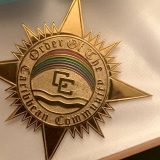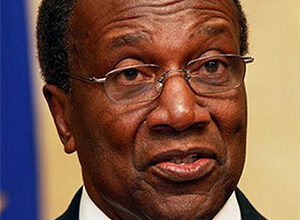Order of the Caribbean Community (OCC)
 The Order of the Caribbean Community is an award given to “Caribbean nationals whose legacy in the economic, political, social and cultural metamorphoses of Caribbean society is phenomenal”
The Order of the Caribbean Community is an award given to “Caribbean nationals whose legacy in the economic, political, social and cultural metamorphoses of Caribbean society is phenomenal”
The award was initiated at the Eighth (8th) Conference of Heads of State and Governments of CARICOM in 1987 and began bestowal in 1992.
Decisions as to award are taken by the Advisory Committee for the Order of the Caribbean Community
The Insignia of the O.C.C. set in gold and the Ribbon of the Order are presented to those honoured.
Privileges and entitlements
There are some privileges and entitlements invested upon the recipients. Some of these are as follows:
The award confers the styling The Honourable upon the recipient and Post-nominals O.C.C.
Members of the Order are accorded the privilege of free movement among Member States of the Community and are issued with a travel document which is assigned similar status to a diplomatic passport.
The right to reside in and be gainfully employed in any Member State, as well as the right to acquire and dispose of property, as would citizens of Member States, are entitlements granted to Members of the Order.
-

Sir Philip Manderson Sherlock
A Jamaican by birth, Sir Philip Manderson Sherlock has been described in the citation for the conferment of his OCC award in 1998 as “the complete Caribbean father figure, an inspiration to generations who knew him and served with him”. A remarkable Caribbean scholar and educationist, Sir Philip is best known for his long and dedicated service as a member…
Read More » -

Sir Meredith Alister McIntyre
Sir Meredith Alister McIntyre, OCC Awardee of 1994, and a venerable Caribbean integrationist was born in Grenada. A highly celebrated West Indian academic and intellectual, and considered one of the great social thinkers of his time, he piloted the movement for integration as Secretary-General of CARICOM from1974-1977, and as Vice Chairman of the West Indian Commission. He was highly acclaimed…
Read More » -

Sir John Melvin Compton
Sir John Melvin Compton, OCC Awardee of 2002, is a Vincentian by birth but sculpted his reputation and legacy as political leader extraordinaire out of the throes of Saint Lucia’s development. Sir John Compton’s political evolution from Chief Minister, Premier and Prime Minister of Saint Lucia symbolises the interconnectedness of the comity of Caribbean nations and the benefits of free…
Read More » -

Sir Edwin Carrington
As the 20th century came to a close, the Caribbean Community continued to be confronted with major challenges and urgent tasks. The changes in the international political and economic system became pronounced after the collapse of the Soviet system in 1989. The world was then configured as unipolar and characterised by a new phase of globalisation. This new phase of…
Read More » -

Sir Arthur Lewis
Sir W. Arthur Lewis, won a Nobel Prize in 1979 for pioneering research on economic development in emerging countries. A professor emeritus of political economy at Princeton, he died in his sleep at his home in Barbados. He published a book, “The Theory of Economic Growth,” in 1954 that is regarded as the seminal study in the field. Sir Arthur,…
Read More » -

Sir Shridath Ramphal
Sir Shridath Ramphal, a national of Guyana, and an international figure of repute received the honour of membership of the Order of the Caribbean Community in the first conferment of 1992. A recipient of numerous awards and honours from several countries, international bodies and academic institutions, including Knighthood from Her Majesty the Queen of England, he has served with distinction…
Read More » -

Brian Charles Lara, T.C
CITATION FOR THE ORDER OF THE CARIBBEAN COMMUNITY (OCC) 2008 English speaking Caribbean communities have made their greatest single cultural investment in the cricket enterprise. Citizens have come to measure the extent of community detachment from the oppressive grip of the colonial scaffold in terms of the competitive excellence of the region’s international team. Since 1886, when the first generation…
Read More »



